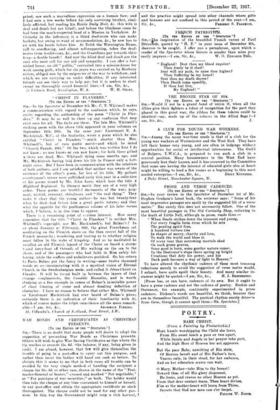PROSE AND VERSE CADENCES.
(To me EDITOR or ens "SPOCIAT011."I
Sia,—In your review in the Spectator of December 1st of Mr.
Stephen Graham's latest book, the reviewer says: "Some of his most impressive passages are spoilt by the suggested lilt of a verse metre." But surely this does not necessarily follow. One of the most beautiful passages in The Old Curiosity Shop, referring to the death of Little Nell, although in prose, reads thus :— " When Death strikes down the innocent end young, For every fragile form from which he sets The panting spirit free, A hundred virtues rise In shapes. of mercy, charity and love, To walk the world and bless it.
Of every tear that eorrowing mortals shied
On such green graves, Some good is born, some gentler nature come*.
In the Destroyer's steps there spring up bright Creations that defy his power, and his Dark path becomes a way of light to Heaven."
To have altered the rhythmic cadence of these most Muumuu reflections merely to avoid the suggestion of verse metre would, I submit, have quite spoilt their beauty. And many similar in- stances might be quoted—I am, Sir, Ac., H. J. Basenzaroe. [Prose has, or can have, cadences of its own. But it ought to have a prose cadence and not the cadence of poetry. Ruskin and Stevenson, for example, continually experimented in prose cadences. Dickens's words are beautiful, we think, because they are in themselves beautiful. The poetical rhythm surely detroola from them, though it cannot spoil them.—Es. Spectator.]


























 Previous page
Previous page